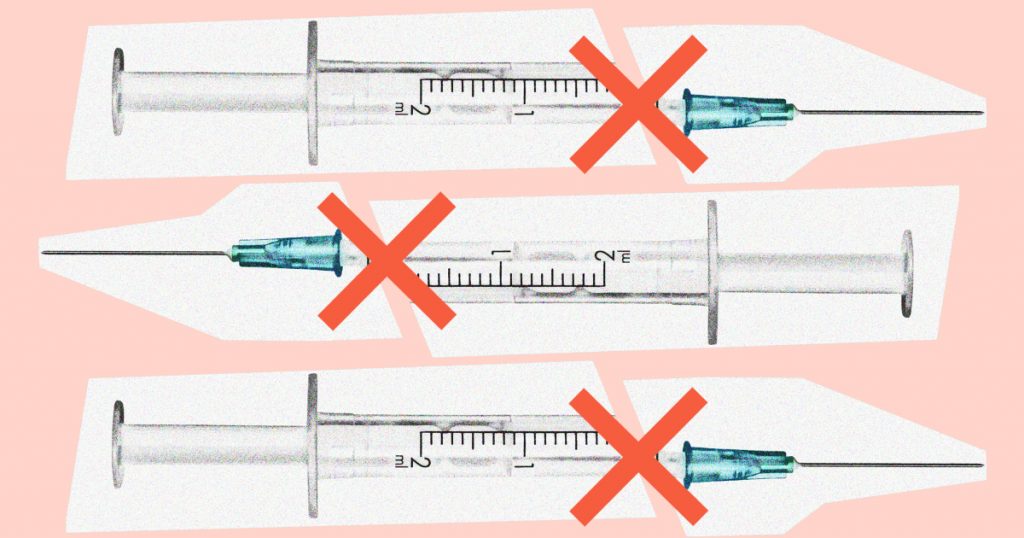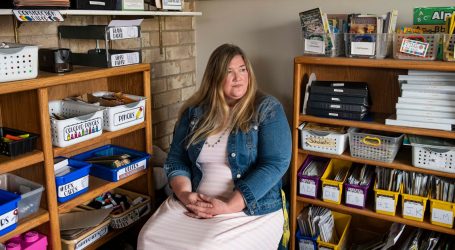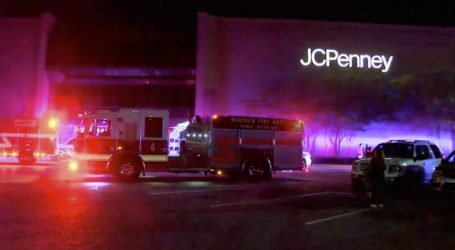HIV Is On the Loose In West Virginia, and so Is a Moral Panic About Needle Exchanges
Mother Jones illustration; Getty
Let our journalists help you make sense of the noise: Subscribe to the Mother Jones Daily newsletter and get a recap of news that matters.It had all the trappings of a full-blown drug bust: confidential informants, undercover cops wearing wires, detectives surveilling the scene. In their report, police in Charleston, West Virginia, would describe the sting in the two-fisted staccato of a cop procedural: “On October 28th, 2020, Det. Daniels acted in an undercover capacity and went to an event which was being held at the Unitarian Universalist Congregation. Det. Daniels had a body wire transmitter capable of audio and visual recording.”
The target was a volunteer-led syringe exchange called SOAR, which posted up in the church parking lot twice a month to distribute clean needles, give out naloxone, and administer HIV tests to hundreds of clients. In October, after a local TV station aired a sensationalist segment that depicted SOAR as an underground network defying the law, Charleston police launched a criminal investigation into the nonprofit. They accused SOAR of violating a city ordinance requiring that harm reduction programs be approved by the police chief or get licenses as required by the state.
Cops posing as drug users attended SOAR events, only to be offered condoms, naloxone, and health kits. On one occasion, an undercover officer even took an HIV test. According to the police report detailing the investigation, volunteers “advised him if he would wait around for the test results, that’s when he would get the free $15.00 gift card.”
At the end of the two-month investigation, Charleston Chief of Police James Hunt concluded that SOAR wasn’t doing anything illegal according to the ordinance as written, but he vowed to work with the city attorney to change the rules.
What began last fall with the would-be bust is coming to a head this month as the Charleston city council prepares to vote on an ordinance that would shut down SOAR and harm reduction organizations like it. The West Virginia legislature is also considering a bill that would restrict community-based syringe exchanges. Its author, Sen. Eric Tarr, recently described SOAR as “eager to dump 312,000 needles into Charleston, West Virginia alone.” The city vote is scheduled for April 19; the state legislature could pass its bill as soon as today.
The stakes couldn’t be higher: Kanawha County, which includes Charleston, is currently experiencing an HIV outbreak that the Centers for Disease Control and Prevention considers “the most concerning in the United States.” Last year, 35 new HIV cases were reported among Charleston’s intravenous drug users. That was just one fewer case than all of New York City had in 2019, at 150 times the population. At a recent city council meeting, a CDC representative warned that the HIV diagnoses that had been reported were likely “the tip of the iceberg.”
At the onset of the police investigation into SOAR, the nonprofit, backed by the ACLU of West Virginia, maintained it wasn’t breaking any rules, since the state doesn’t require harm reduction programs to have licenses to distribute syringes. Still, the program suspended syringe distribution during the investigation, which dragged on for two months. Attendance at SOAR events plummeted. Those who did come were desperate for clean syringes, knowing that sharing needles meant risking HIV.
“By far the saddest thing I ever saw was that we approached this woman and she was like, ‘You don’t have syringes?’” said Sarah Stone, a SOAR co-founder. Stone explained that SOAR wasn’t distributing syringes. In Stone’s recollection, the woman sat on the ground, wept, and asked, “You have any bleach?” SOAR began distributing Ziploc baggies full of bleach, warning users that it wasn’t guaranteed to sanitize their needles. Stone described the development as a “new low.”
In December, when SOAR restarted its syringe distribution, the program’s wound station was full of clients with abscesses. “People had been reusing the same syringes again and again and again,” recalled Robin Pollini, a West Virginia University epidemiology professor who works with SOAR. “They were like, ‘I’ve been using the syringes you gave me six weeks ago until they break off in my arm.’”
The science on syringe exchanges is clear: Decades of research have found that the programs dramatically reduce overdose rates and disease transmission, not to mention that they increase entry into detox programs, reduce needle litter, and save money. In addition to clean syringes, the programs typically offer medical care, screening for HIV and hepatitis C, and information on how to access drug treatment. But for the opponents of such programs, reducing harm means enabling drug use. That unfounded logic helps explain why 11 states still don’t have a single syringe exchange program.
SOAR had reinvigorated a decades-old moral panic. It played out in city council meetings and news segments, ultimately turning the investigation and subsequent policy proposals into a referendum not just on SOAR but on harm reduction and the role of science in responding to a viral outbreak.
“SOAR has really become this vehicle that everyone is putting all of their fear and stigma and concerns on,” said Loree Stark, legal director of the ACLU of West Virginia. “Any time someone is talking about harm reduction now in West Virginia and whatever the parade of horribles could be, SOAR is where they’re starting from.”
To say that an HIV outbreak in Charleston was predictable is something of an understatement.
For two years, until 2018, the county’s health department operated a bustling needle exchange. On its busiest day, 483 clients received services in just eight hours—in a city of about 50,000 people. As the New York Times later noted, “This might have been its downfall: It was too successful.” Critics of the program, like then-Mayor Danny Jones, claimed the exchange served as a “mini-mall for junkies and drug dealers.” Charleston police complained about increased syringe litter. In early 2018, the grievances reached a fever pitch when local news reported that a 5-year-old girl had accidentally stuck herself with a needle in a McDonald’s bathroom.
Then, as now, the police investigated the syringe exchange program, the proceedings made all the more surreal by the specter of cops investigating their own county health department. Ultimately, the police chief at the time ordered the department to implement strict rules around when and how clients could get new syringes. Clients would be required to show ID and return syringes to get new ones in a strict “one-to-one” exchange.
The rules resembled those of the other syringe exchange in town, Health Right, a program that continues to be held up by city council members as the model exchange. “If you come back without needles, you will not get any more needles,” Health Right director Angie Settle said in 2018. “There are no second chances.” The program has among the lowest rates of syringes distributed per capita of any state-certified harm reduction program, according to an analysis by Mountain State Spotlight.
Such restrictive rules are associated with higher rates of disease transmission. (Indeed, they directly contradict the CDC’s best practices for syringe exchanges.) Rather than implement them, county health officials suspended the program.
A few months later, the state Bureau for Public Health, led by a commissioner named Rahul Gupta, stepped in to audit the program. The resulting 62-page report primarily took issue with the program’s record-keeping and suggested that the syringe exchange would have fared better with more restrictive rules, like barring clients from picking up clean needles for other users. The authors ultimately recommended suspending the already-suspended program, even as they acknowledged a “significant limitation” to their research: They hadn’t talked to a single syringe exchange client in the course of their evaluation. After the audit published, Gupta suggested that other needle exchanges could learn from its suggestions. Now he is reportedly a top contender to be the next drug czar under the Biden administration.
Public health experts across the country pushed back against the suspension of the county program, warning that an uptick in overdose fatalities and disease transmission would likely follow. Brumage told the New York Times that the county was at “grave risk for an HIV outbreak just like the one in Scott County,” referring to the Indiana county that experienced a roiling HIV outbreak in 2014 when syringe exchanges were barred under the leadership of then-Gov. Mike Pence. Brumage warned, “We’re sitting on a powder keg.”
In 2019, Johns Hopkins researchers confirmed Brumage’s fears: In the absence of a syringe exchange, Charleston’s IV drug users were sharing and reusing old needles. “I mean, you’ve got four or five people sharing a needle, and then they’ll throw it down on the ground and maybe somebody else come along and they pick it up,” a 49-year-old user told the researchers. “One needle will probably do 15 people.” Meanwhile, HIV cases were proliferating in Cabell County, just an hour from Charleston. Brumage told Mother Jones in 2019 that Charleston was still sitting on a powder keg, “But this year, the fuse is lit.”
A network of volunteers stepped in to fill the gap. They included HIV specialists, social workers, nurses, and community organizers. They called themselves Solutions Oriented Addiction Response, or SOAR. “Towards the end of 2019, we started driving around after we got off work, after the sun was falling,” said SOAR co-founder Joe Solomon. “We ordered some syringes on Amazon, got some bottles of naloxone.” At first, users assumed SOAR volunteers were undercover cops. “By the next time we came out, people, instead of calling us cops, were calling us angels,” said Solomon.
As SOAR grew, they began holding semimonthly syringe exchange events, first in a McDonald’s parking lot and, as more people came, outside a Kmart. By the summer of 2020, the events were serving 400 individuals each month. In August, SOAR partnered with the Charleston Area Medical Center to offer HIV testing to clients. Within just six testing events, the group had identified eight new HIV diagnoses.
“I’ve never seen that before,” said Pollini of West Virginia University. “I tell my colleagues, and they are flabbergasted. That you would go out on your first night and find an HIV positive…‘tip of the iceberg’ is no joke.”
Christine Teague, who leads the HIV program at the Charleston Area Medical Center, would later tell the city council that SOAR has “really been one of the only ways that I’ve been able to engage with the people that I’m tasked to take care of.” Teague works with the Health Right program as well. “Multiple times there are people who’ve come who’ve asked for help with needles and they’ve turned them away because they’re on probation, because they didn’t turn back the appropriate amount of needles each time,” said Teague. “That’s discouraging, because you had had an opportunity to give somebody something to help themselves.”
On Monday, West Virginia Sen. Joe Manchin submitted a congressional inquiry into the CDC’s depiction of the outbreak on behalf of the Kanawha County Commission. In a letter to the senator, the commissioners wrote, “We are concerned that statements referring to the ‘HIV outbreak’ in Kanawha County as the ‘most concerning’ are being made without factual and empirical evidence.” Their concern didn’t center on the outbreak. Rather, their concern was the concern itself.
The statements in question were those of Dr. Demetre Daskalakis, who directs the CDC’s HIV prevention division. At a city council meeting in late February, he had implored council members to be open to community-based syringe exchanges.
“I want to just make sure that we set the urgency really clear in the room,” said Daskalakis. Without adequate services, “HIV will continue to spread, and could result not only in tens of cases, but in hundreds of cases.” Some council members were skeptical, asking Daskalakis who invited him to Charleston, and if he was being paid for his presentation.
On the other side was Eric Smith, a retired Charleston Police Department sergeant who leads the local Fraternal Order of Police chapter. “You hear them talk about the rise in HIV—well, let’s talk about everybody else out here,” he said. “The needle litter, that is a huge, huge issue.”
The meeting took on the air of a prosecution questioning its star witness. Council member Shannon Snodgrass asked, “Because we had such an elaborate, extensive needle distribution—and you all remember how that was, and so does a lot of the community—but did we attract more people here, to Charleston?”
“Absolutely,” said Smith. “I would imagine that with more junkies, more addicts coming in,” said Smith, “you’ll get larger drug networks…to fulfill that need.” Back in 2018, he said, there were “piles of needles everywhere.”
“Let’s talk about the elephant in the room,” continued Snodgrass. “They’re putting illicit drugs in the needles. So with that element in our city, do you think that it increases the amount of crime that we experience in this community?”
“Absolutely,” said Smith.
The ordinance before the city council, co-authored by Snodgrass, requires that syringe exchanges have a strict one-to-one exchange and mandates that the programs mark each syringe with identifying information “that clearly and unambiguously allows for the identification of each syringe dispensed by the program that dispensed it.” Breaking the rule would result in a misdemeanor and a minimum fine of $500.
The bill before the state legislature would require that syringe exchanges have the “goal” of one-to-one exchange and offer services from a licensed health care provider—a requirement that many community-based exchanges won’t be able to meet. Further details are still the subject of heated debate. A recent version of the bill would require exchanges to have support from the majority of the local governing body; anyone operating without a license would be hit with a $10,000 fine and a yearlong prison sentence. When it comes to harm reduction legislation, the legislation threatens to be “among the most restrictive in the country,” said Corey Davis, an attorney at the Network for Public Health Law. He concluded, “It would be a huge step backward.”
Brumage, the former county health department head, analogizes the impending legislation to the “Titanic sailing right for the iceberg, and you can’t do anything to stop it.” Already, SOAR alone has caught nine new cases of HIV since the beginning of January. “If you’re only seeing this many cases now, before mass testing, it’s going to be explosive,” said Brumage. “And it won’t be limited to the city of Charleston.”
Syringe exchange advocates argue that the syringe litter argument doesn’t stand up to scrutiny. “You would think that we’re swimming in syringe litter in Charleston,” said Brooke Parker, a social worker volunteering with SOAR. “Swimming through it, literally. The lies that are manufactured because of all of this, and the level of blame—it blows my mind.”
Loree Stark, the ACLU legal director and a Charleston resident, said she’s never come across a discarded syringe in the city. If needle litter is the driving concern, she pointed out, the city council could enact legislation mandating more needle disposal boxes.
She suspects the fear of SOAR goes beyond syringe litter or even harm reduction. “It’s a discomfort with people that are in poverty, people that live differently than us,” she said. “And it’s really a horrible shame because West Virginia is so entrenched in poverty.” She drew parallels to a bill the Charleston City Council recently considered that would have limited panhandling. (The ACLU threatened to sue if the legislation passed; ultimately, it was dropped.)
In West Virginia, long an epicenter of the opioid epidemic, policy around harm reduction is personal: Some of the most outspoken voices on both sides of Charleston’s syringe exchange debate are in recovery themselves. Danny Jones, the former mayor who decried the county program, is a recovering alcoholic; his son has struggled with a heroin addiction. Mike Pushkin, a Kanawha state delegate, has been frank about his own bouts with addiction. On Wednesday he warned supporters of the state bill that they were moving recklessly. “It’s a lot of people who don’t understand the program and haven’t taken any time to learn about the program, yet want to dictate how the program is done to a lot of people who have studied this for their entire lives,” he said.
When Pollini arrived in West Virginia four years ago, she thought the push against syringe exchanges simply came from a lack of knowledge about the evidence behind harm reduction. “I thought, ‘Oh, great, we just need more science,’” she said. As time passed, “It was like, ‘Okay, maybe they just don’t understand the science. Maybe I’m not doing a good enough job.’” Now, Pollini thinks people understand the science—they just don’t care about it. “They really don’t care. And for me, that’s been difficult because I don’t know where to go from there, if science and facts are not persuasive to you,” Pollini went on. “We know for a fact what’s going to happen if we don’t have these programs.”
Like other SOAR volunteers, Pollini saw the abscesses that developed last fall when clients didn’t have clean needles. She knows that HIV is quietly spreading among the city’s drug users. “Since the last time I spoke with you, I need two hands to count the number of people I know in this community who have died of overdose or some kind of drug-related malady,” she said on Tuesday. We had spoken just two weeks before.
Her voice had cracked. “I think all of us get really emotional because we know what happens next and it’s going to happen to people that we really care about,” she said. “We know it’s completely preventable.”





